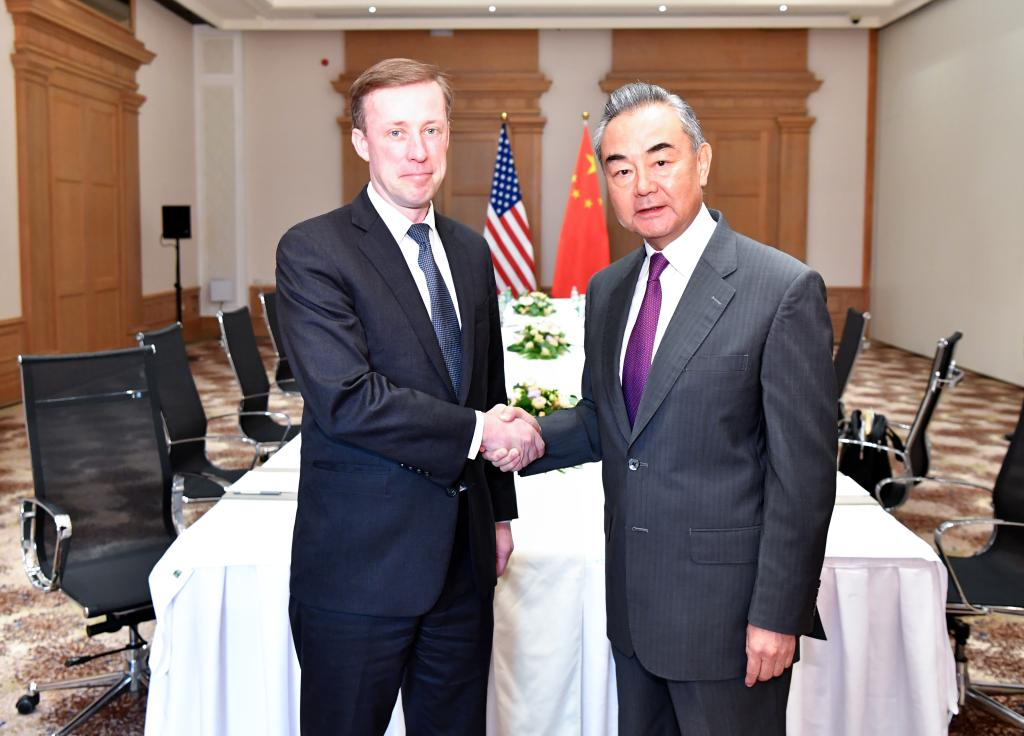Series of talks serve regional, world peace
By ZHANG YUNBI | CHINA DAILY | Updated: 2023-09-19 06:57

China's major-country diplomacy engages US and Russia in a constructive manner
Since the weekend, Beijing has impressed observers with separate series of intense, high-level consultations with Washington and Moscow, one after another.
Senior Chinese diplomat Wang Yi completed two days of talks with United States National Security Advisor Jake Sullivan in Malta on Sunday, and he arrived in Russia on Monday for a four-day China-Russia consultation on strategic security.
Analysts said the two series of talks — one closely following the other — are part of China's efforts to carry forward its regular two-way dialogues with influential major countries and help shore up nations' concerted efforts to stabilize the Asia-Pacific region.
Both China and the US described the weekend series of consultations as "candid, substantive and constructive" in official readouts released on Sunday. As part of the talks' outcomes, the two sides agreed to hold three China-US consultations — on the Asia-Pacific region, maritime affairs and foreign policy.
On Monday morning, Beijing announced that Wang, a member of the Political Bureau of the Communist Party of China Central Committee and director of the Office of the Foreign Affairs Commission of the CPC Central Committee, will hold the 18th round of China-Russia strategic security consultations in Russia from Monday through Thursday.
Diao Daming, a professor at Renmin University of China's School of International Relations, said the common background of the two series of talks is that the world today is in turmoil and chaos, the global economy has a long way to go in recovering in the post-pandemic era, and the world has widespread expectations of an improved international order.
During the weekend talks, China and the US also discussed the Asia-Pacific region, the Ukraine crisis and the Korean Peninsula situation, among other international and regional issues.
"China has retained its steady pace and resilience against various changes when navigating its major-country diplomacy, and it earnestly looks to shape relations with major countries in order to improve the region's situation and the world's trajectory," Diao said.
"What China wants is to work with the international community to rise to the challenge, and it has always tried to inject the world with a steady stream of positivity and certainty," he added.
Wang and Sullivan previously met and talked in Vienna, Austria, in May. Before that, high-level strategic communication between China and the US took place over the past two years in such places as Zurich, Rome and Luxembourg.
During the talks with Washington, the Taiwan question and the US perception of China's development were high on the agenda.
An unnamed senior official with the Foreign Ministry who took part in the weekend talks said the multiple rounds of consultations as a whole "exceeded 12 hours in total", and "the Taiwan question consumed the longest time".
The official told Chinese media that Wang said the most essential status quo is that both sides of the Taiwan Strait belong to one China, and the tension across the Strait originates from the increasingly rampant "Taiwan independence "activities by Taiwan's Democratic Progressive Party.
The right path for peaceful resolution of the Taiwan question is "resolutely objecting to 'Taiwan independence' and supporting the peaceful reunification of China", Wang said.
China has always rejected attempts to use competition to define the whole of China-US ties, and it opposes economic decoupling under the pretext of "de-risking", Wang told Sullivan.
Wang expressed serious concerns over the US suppressing and frustrating China in terms of science and technology and over the US' unilateral, unreasonable sanctions on Chinese businesses, institutions and individuals.
Su Xiaohui, deputy director of the Department of American Studies at the China Institute of International Studies, said the "several rounds "indicate the intensity of the negotiations and "the large number of agenda items between Beijing and Washington".
"And Beijing's message is clear — not to cross the line over the Taiwan question and stop suppressing and encircling China," she said.
"Washington is expected to work toward the same goal alongside China and take more positive moves in response to China's message," she added.
Meanwhile, the previous round of consultation under the China-Russia strategic security consultation mechanism took place in Fuzhou, Fujian province, in September last year. The mechanism was established in 2005.
Observers noted that the mechanism is part of the evolving China-Russia comprehensive strategic cooperation in the new era.
The trip to Russia this week by Wang, who was invited by Nikolai Patrushev, secretary of the Security Council of the Russian Federation, for the 18th round of consultation is "a routine activity within the framework of the China-Russia strategic security consultation mechanism", Foreign Ministry spokeswoman Mao Ning said on Monday.
The trip to Russia "aims to implement the important consensus reached by the heads of state of the two countries, promote the development of bilateral relations and carry out in-depth communication on important issues related to the strategic security interests of the two countries", Mao said.
She pointed to both countries' shared identity as permanent members of the United Nations Security Council and major emerging market economies.
"The two countries have always maintained close communication on major, strategic and overarching issues of common concern," she added.
Chinese Ambassador to Russia Zhang Hanhui said that "China-Russia strategic cooperation is the 'mainstay' of maintaining international peace and security", and "the significance and impact of China-Russia relations go far beyond the bilateral context".
In an interview published last week on the People's Daily website, Zhang said the two sides "work closely together in the international arena", resolutely oppose hegemony and power politics, and adhere to genuine multilateralism.
























